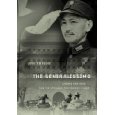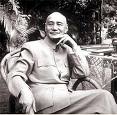Chiang Kai-shek Newly Bioed and Reconsidered
Posted: August 4th, 2009 | No Comments » Every few years a new biography of Chiang Kai-shek comes along. The last big one was Jonathan Fenby’s Generalissimo Chiang Kai-shek and the China He Lost, which I enjoyed and remains a useful reference tool. However, Fenby’s bio of CKS came out in 2005 and a lot has happened since then in China and this makes it important as a new biography of CKS is now out from Jay Taylor – The Generalissimo: Chiang Kai-shek and the Struggle for Modern China.
Every few years a new biography of Chiang Kai-shek comes along. The last big one was Jonathan Fenby’s Generalissimo Chiang Kai-shek and the China He Lost, which I enjoyed and remains a useful reference tool. However, Fenby’s bio of CKS came out in 2005 and a lot has happened since then in China and this makes it important as a new biography of CKS is now out from Jay Taylor – The Generalissimo: Chiang Kai-shek and the Struggle for Modern China.
The last few years have seen the rapid rise of general interest in Confucianism and the Party’s incorporation of Confucianism as another plank in both its attempt to shore itself up and heighten its legitimacy (as well as a dose of real politik) as well as playing into the general nationalist agenda. CKS’s was of course indebted to Confucianism for so much of his own thought process.
Confucianism is also of course a useful way of pressuring people to fall into line, conform and accept orders while also being part of China’s overseas soft power campaign. We see it clearly now in campaigns urging people to take more responsibility and show filial piety in looking after ageing parents and not complaining about the lack of decent healthcare etc. It’s impossible for those familiar with CKS’s New Life Movement of the 1930s and the current spate of ever increasing social control campaigns dealing with everything from patriotism, spitting through to supposed internet game addicts and obesity. My old hero Carl Crow noted that while the KMT promoted and enforced the NLM in the 1930s and during the War Madame Chiang continued to smoke away nineteen to the dozen in private and the Chiang were hardly fiscally scrupulous – today’s venal communist officials uncovered with their mistresses, stashes of cash and private fiefdoms while pushing the Harmonious Society line in public are hardly anything new.
 At the same time among a section of academia in China there has been a growing interest in reinterpreting the republican era. Though the Great Communist Party Myth of China that infests the state media, education system, university syllabuses, approved films etc is of course that CKS and the republic were hopelessly corrupt this is being reassessed semi-privately. It’s always fascinating to see how the Whig historians of China (which they basically act like as far as I can tell) arguing for ever progressing society cope with issues like warlords, Taiping rebels, pirates, Boxers and Chiang Kai-shek. CKS of course has taken all the blame for everything. An attitude that seems to have filtered into at least some foreigners as the myth gets repeated in books by westerners too now quite regularly I note. In the English language press in China those foreigners who agree to write editorials and slightly odd ‘think pieces’ for Xinhua now regularly use (or allow their editors to insert) the term ‘liberation’ to describe 1949.
At the same time among a section of academia in China there has been a growing interest in reinterpreting the republican era. Though the Great Communist Party Myth of China that infests the state media, education system, university syllabuses, approved films etc is of course that CKS and the republic were hopelessly corrupt this is being reassessed semi-privately. It’s always fascinating to see how the Whig historians of China (which they basically act like as far as I can tell) arguing for ever progressing society cope with issues like warlords, Taiping rebels, pirates, Boxers and Chiang Kai-shek. CKS of course has taken all the blame for everything. An attitude that seems to have filtered into at least some foreigners as the myth gets repeated in books by westerners too now quite regularly I note. In the English language press in China those foreigners who agree to write editorials and slightly odd ‘think pieces’ for Xinhua now regularly use (or allow their editors to insert) the term ‘liberation’ to describe 1949.
Taylor’s new bio is written within these contexts which makes it interesting and relevant. There are some good points in Taylor’s biography too – that CKS did worry about his fascistic Blue Shirts. However, I think by the time he did this the rabid dogs were out of their cages and reining them in was pretty impossible – a common problem, ask anyone who’s ever created a paramilitary wing how easy they are to control!!. One wonders whether the CPC worries about some of its somewhat autonomous affiliates, such as the Xinjiang Corps, and whether or not they could do anything about them anyway even if they did want to condemn their excesses.
The KMT was of course corruption-ridden and the Chiang-Soong clan responsible for far more than their fair share of this problem. However, the CPC became corrupt quickly too when in power (and before) and this problem hasn’t been resolved yet. Chiang and the KMT invariably enforced China’s continental empire across Tibet, Xinjiang (and in their case all of Mongolia too) which resonates with the Party’s policy now in the last year or so and the last month as events in Tibet and Xinjiang show.
The Xian Incident of 1936 and CKS’s kidnapping was an even more important than most previously thought. CKS when given the opportunity to strike against the communists and possibly wipe them out did not as he had given his word not too – it’s hard to see any winner from this decision to stand on a point of honour (and given subsequent history – perhaps an overrated virtue in this case) than Mao. It leads to one of those great what ifs of history? If Mao had been removed courtesy of the Nationalist air force how would things have played out?
There’s far more I could say about this bio but who the hell reads long reviews these days on the internet? Taylor’s bio is a good read- I urge those people – especially those foreigners who seem to actually be trailing current Chinese academic thought and still denigrating CKS at every opportunity – to read Taylor’s book and perhaps challenge the Great Communist Party Myth and reassess their opinion of CKS and the KMT. Strangely in both some good ways and some very bad ways the PRC is moving towards something similar to what CKS envisaged and might have moved towards had he not let his regime become so incestuously corrupt and, of course, not had Japanese militarism to deal with. Some more of those great what ifs??
Leave a Reply